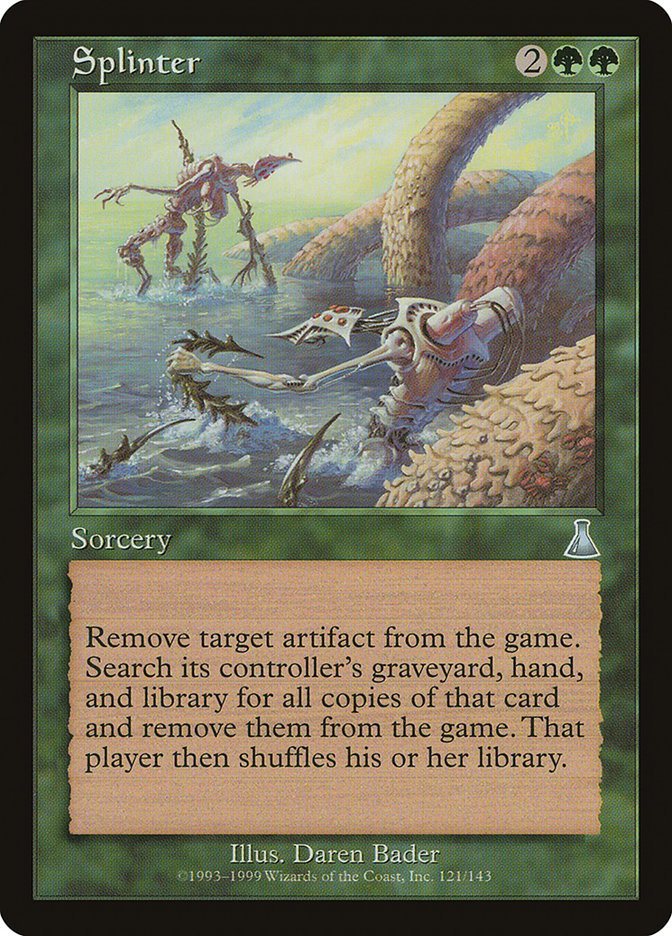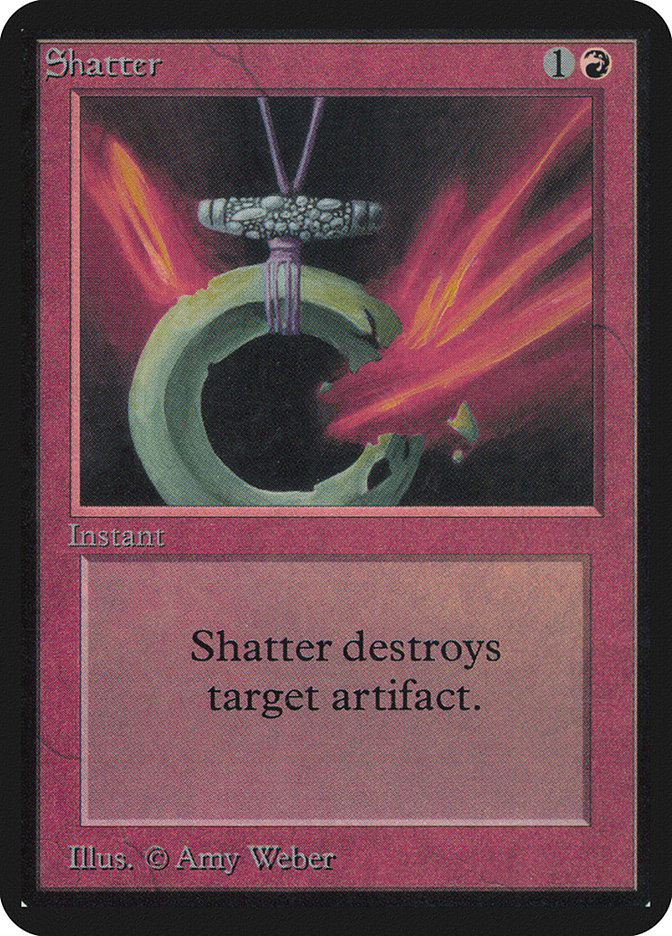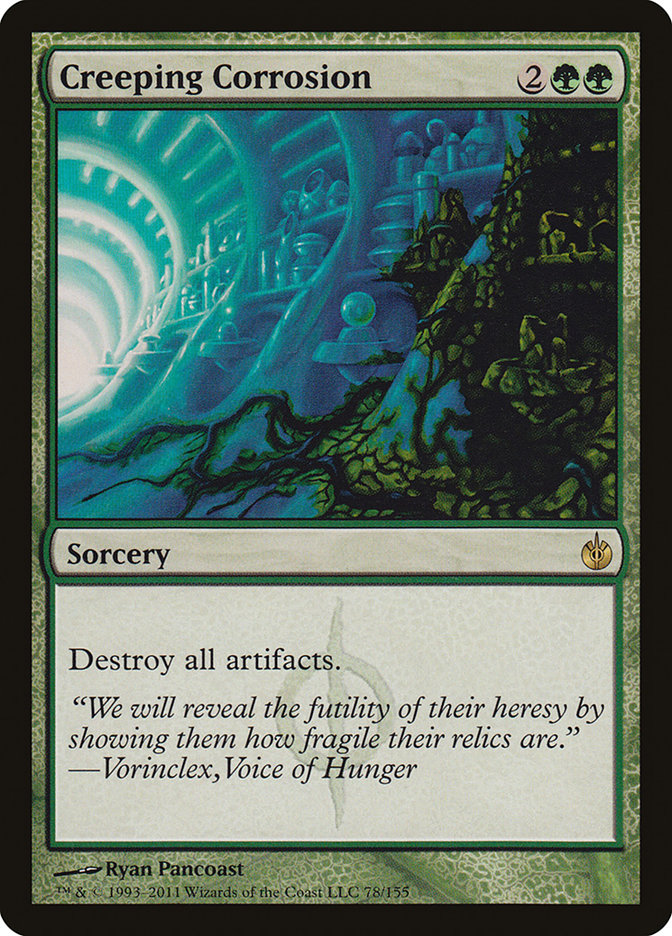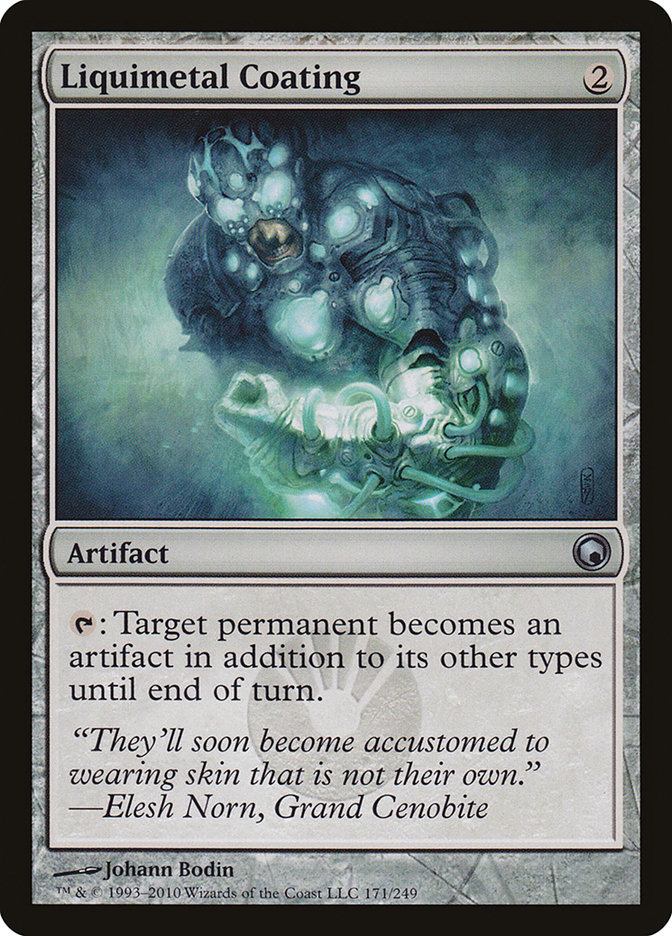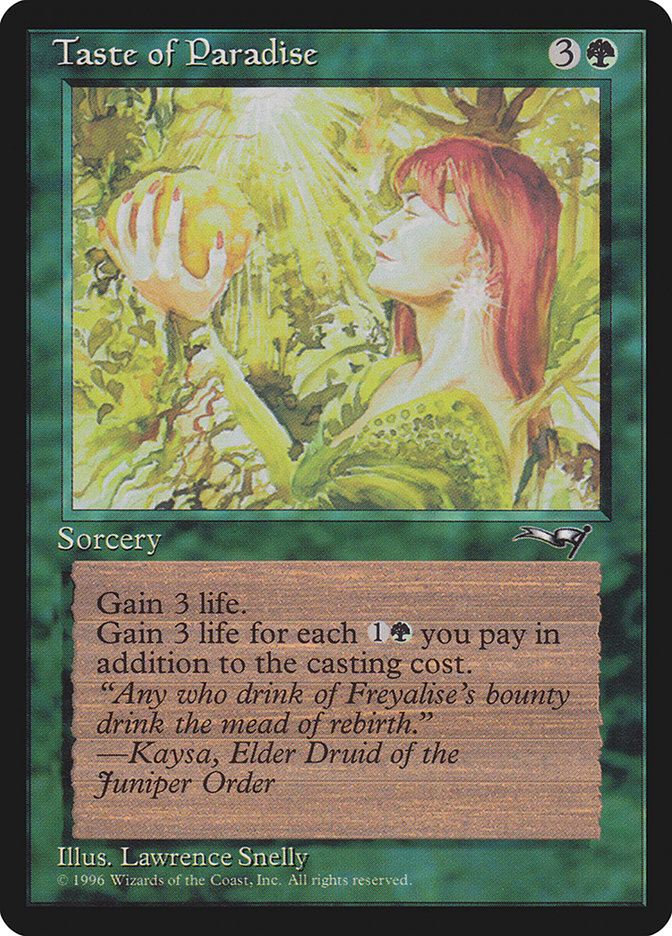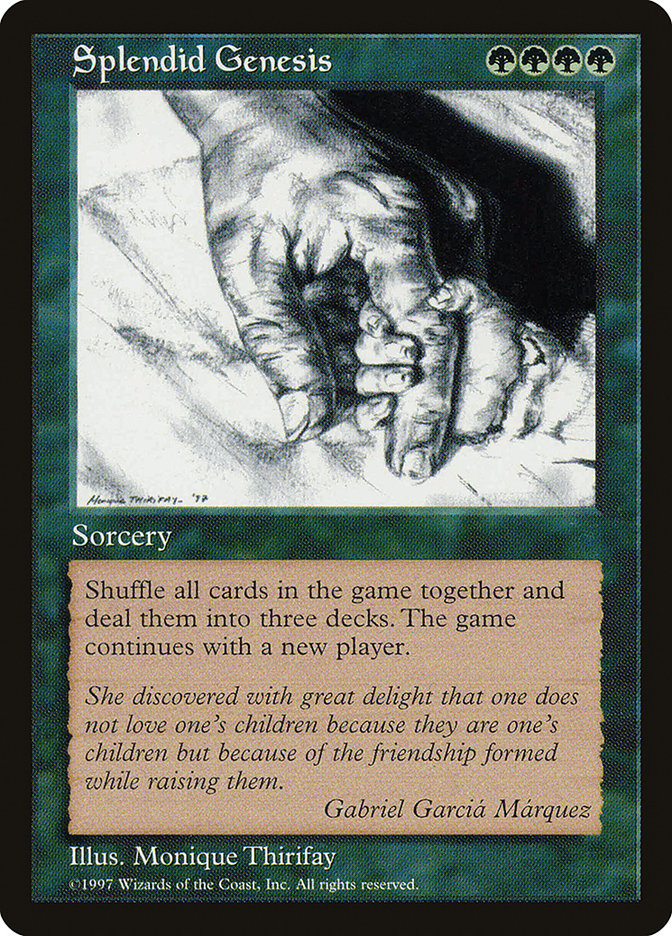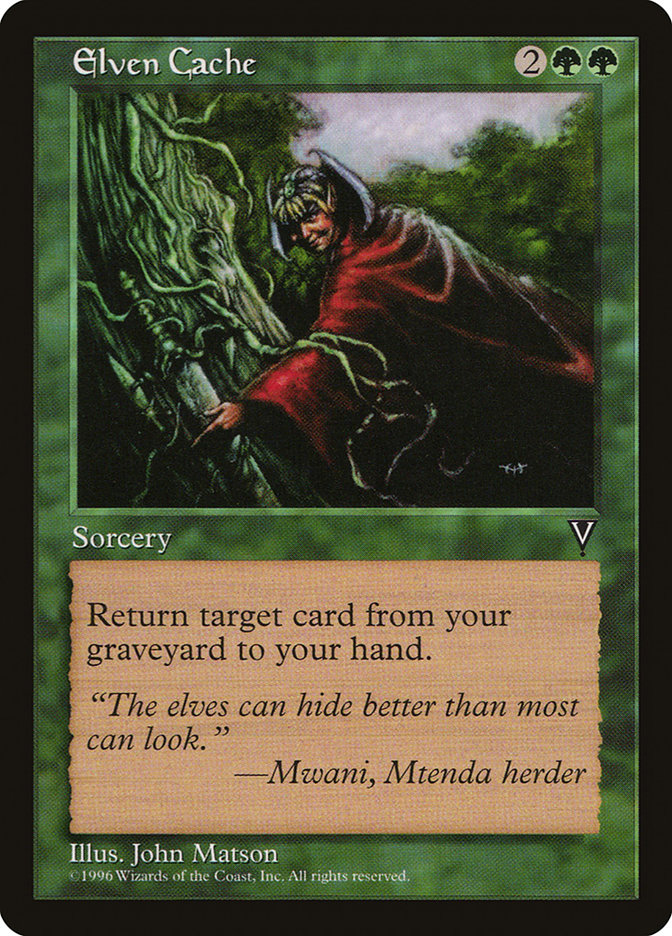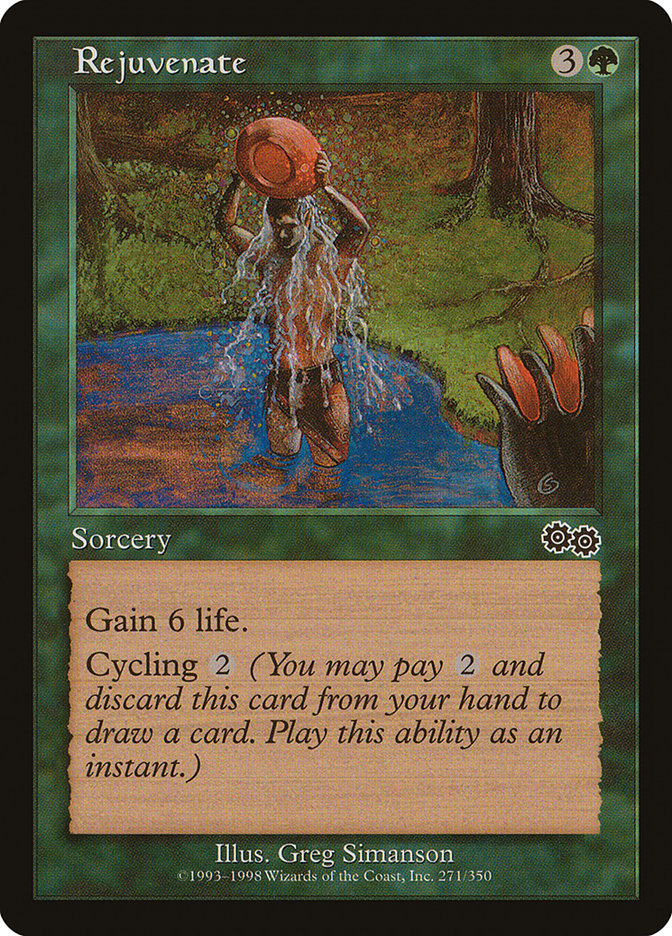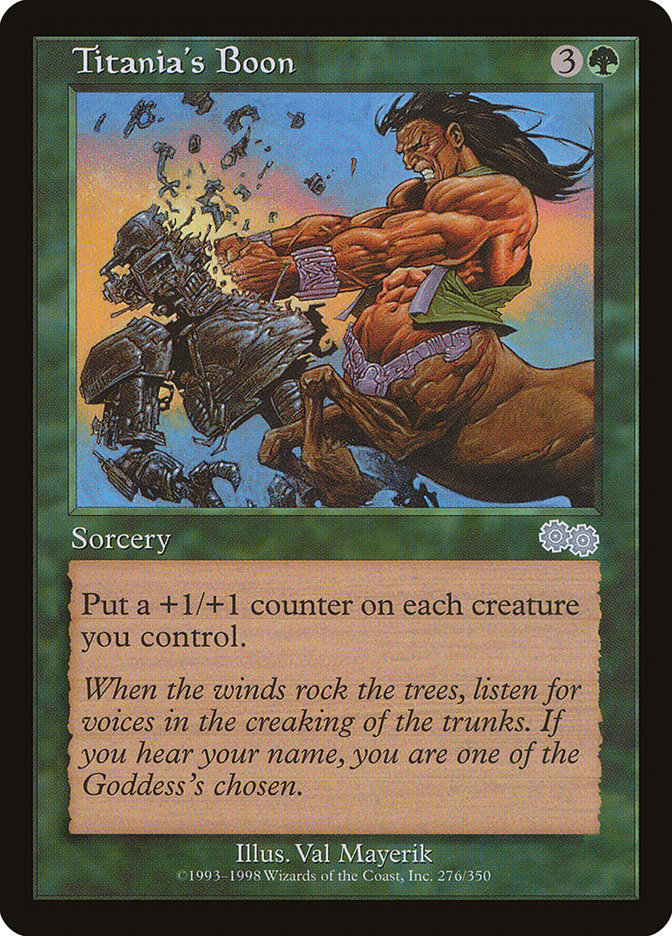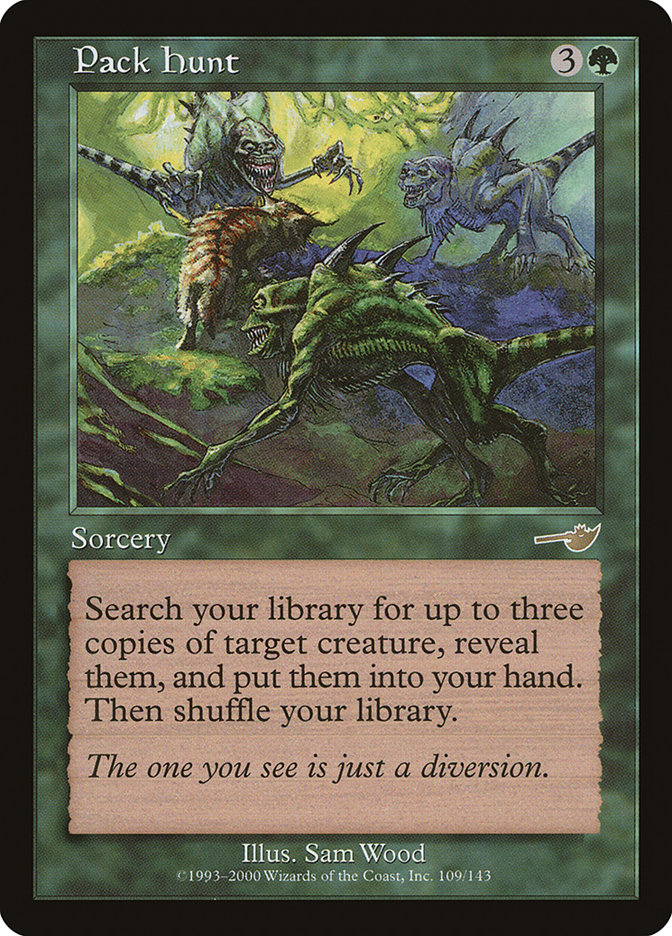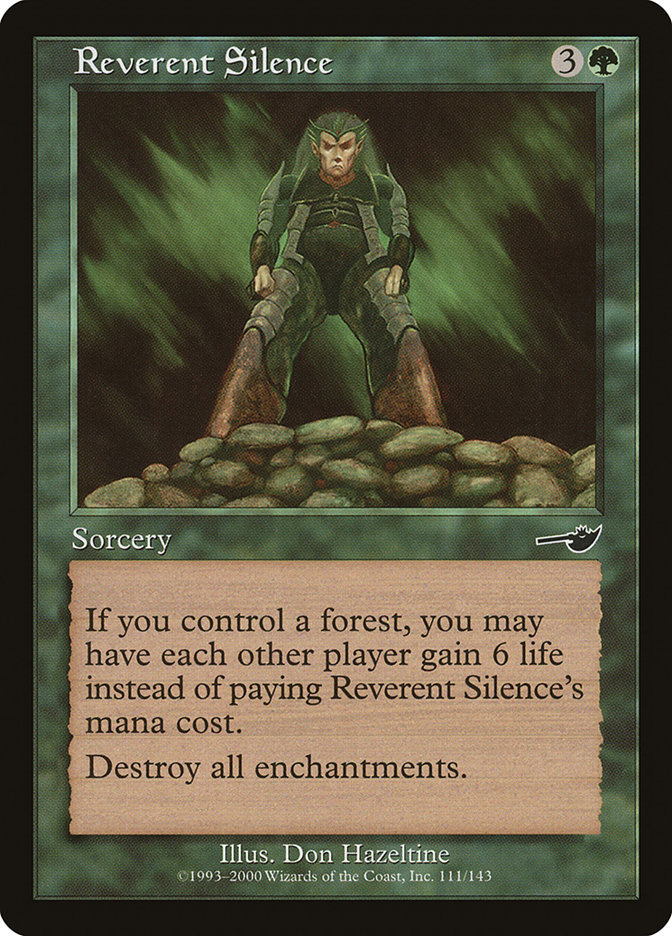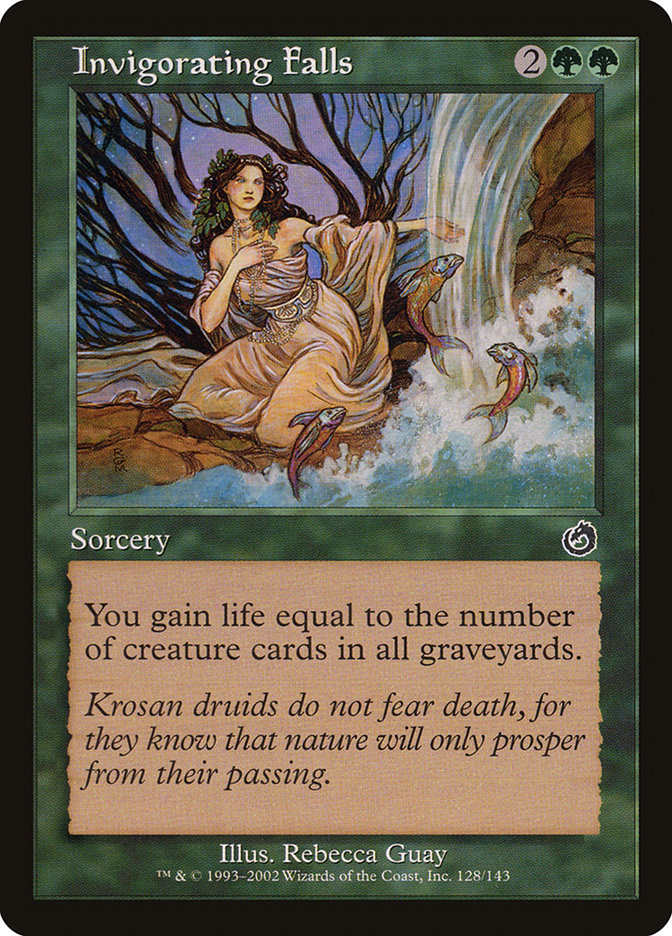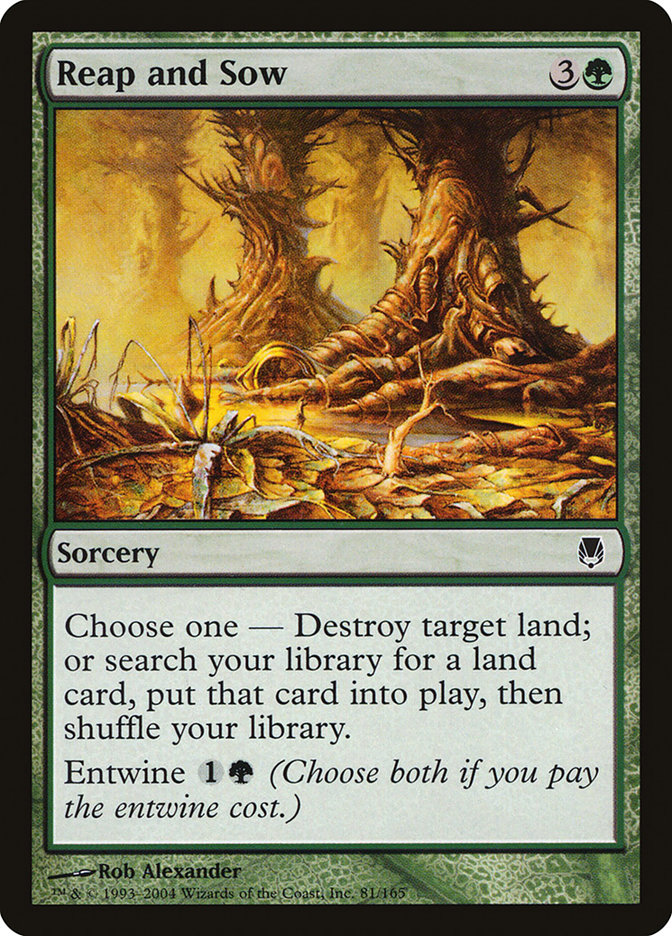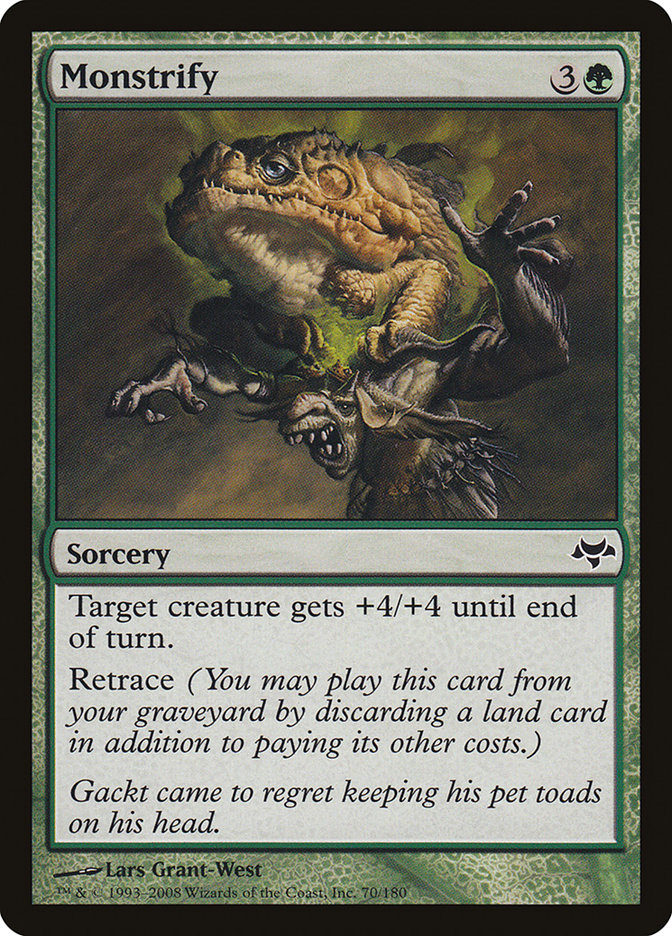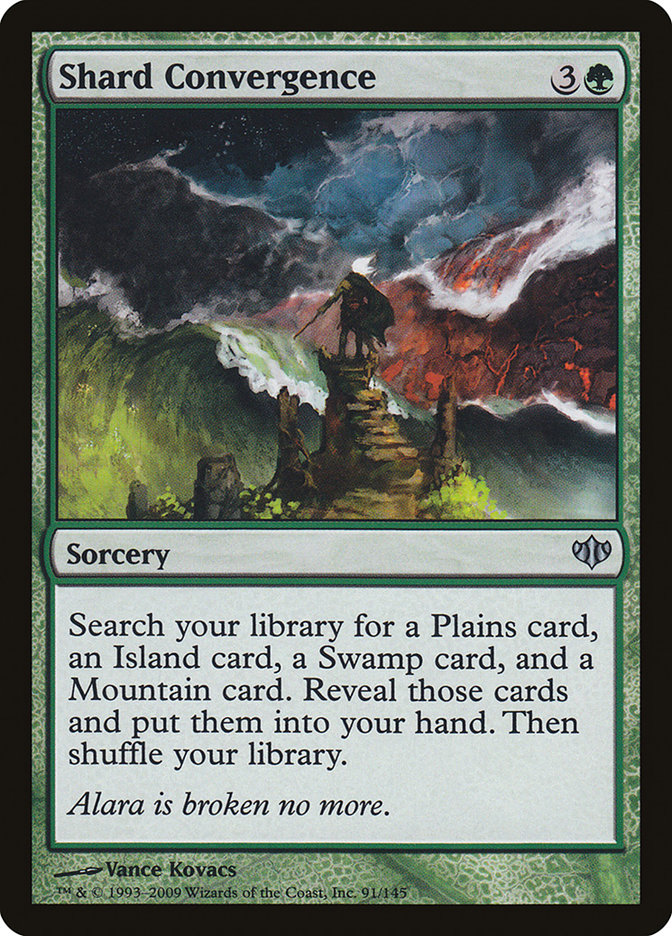Splinter MTG Card
| Card sets | Released in 3 setsSee all |
| Mana cost | |
| Converted mana cost | 4 |
| Rarity | Uncommon |
| Type | Sorcery |
Text of card
Remove target artifact from the game. Search its controller's graveyard, hand, and library for all copies of that card and remove them from the game. That player then shuffles his or her library.
Cards like Splinter
Splinter, from Magic: The Gathering, is a unique spell that delves into the destruction of artifacts. Its closest relative is the well-recognized Shatter, which shares the straightforward approach of destroying target artifacts without additional effects. Splinter, though, expands on this by not only destroying an artifact but also exiling all cards with the same name from the opponent’s deck.
Comparatively, Creeping Corrosion is another spell that targets artifacts, but it wipes clean all artifacts the opponent controls in a single swoop. Although broader in its effect, it doesn’t offer the surgical precision or the exile effect provided by Splinter. Liquimetal Coating is another intriguing piece of the puzzle, as it can turn any permanent into an artifact, which could then be targeted by Splinter, vastly increasing its versatility in a well-synergized deck.
Assessing the options, Splinter stands out in strategies aimed at dismantling key components of an opponent’s arsenal, especially in games where pinpointing specific threats is the pathway to victory. It’s a powerful niche card for anyone looking to disrupt artifact-centric decks in Magic: The Gathering.
Cards similar to Splinter by color, type and mana cost
Card Pros
Card Advantage: Splinter turns any unwanted artifacts or enchantments into an arsenal of delayed threats, essentially trading one card for multiple future answers. This distribution of resources can tip the scales in your favor over several turns, providing a sustained advantage.
Resource Acceleration: By removing potential roadblocks, Splinter enables smoother gameplay and paves the way for more impactful plays. While it may not produce mana or tokens directly, the acceleration comes from being able to deploy your own strategies unimpeded.
Instant Speed: The flexibility of acting at instant speed cannot be overstated. With Splinter, you can adapt to the evolving battlefield, making decisive moves even during your opponent’s turn. This reactive capacity ensures that you’re always one step ahead, disrupting the opponent’s plan with precision timing.
Card Cons
Discard Requirement: One of the inherent downsides to the Splinter card is the necessity to discard cards to unleash its potential. This can be particularly counterproductive when your hand is already dwindling, and relinquishing any card could mean sacrificing crucial strategies or future plays.
Specific Mana Cost: Splinter demands a precise combination of mana types in order to be cast—specifically green. This cost structure inherently confines the card to green-centric or multicolored decks, potentially excluding it from a variety of other deck archetypes where it could have synergized if not for its rigid mana requirements.
Comparatively High Mana Cost: With a significant mana investment required to play Splinter, players might find themselves questioning its efficacy. In the sphere of MTG, where economy and efficiency reign, the card’s high cost in relation to its impact on the game is sometimes seen as suboptimal. Other cards at a lower mana cost could provide more immediate benefits or a better overall advantage to your position on the battlefield.
Reasons to Include in Your Collection
Versatility: Splinter is a powerful tool that can be incorporated into a variety of decks, notably those with a strategy centered around denying resources or dismantling opponent strategies. It offers a precise way to remove key components from your opponent’s deck, disrupting their game plan effectively.
Combo Potential: This card works excellently in combination with cards that reveal the contents of an opponent’s library or hand, thereby allowing you to target critical pieces for removal. It lights the fuse for combos that dismantle an opponent’s deck, one card at a time.
Meta-Relevance: In environments where certain cards or combos are prevalent, Splinter shines by removing not just one, but all copies of a threat directly from the game. Its usefulness scales with the predictability of the meta, making it a valuable asset when you have a good understanding of what you’re likely to face.
How to beat
Splinter is a unique card that targets the very foundation of a deck’s strategy in Magic: The Gathering. Players often utilize cards that form the core of their deck’s mechanics, and Splinter efficiently disrupts this by exiling all the copies of a targeted artifact. To effectively counter Splinter’s devastating potential, consider a strategy that diversifies your threats. Since Splinter focuses on artifacts, relying less on them and more on enchantments or creature-based strategies can reduce its impact.
Including cards that can give your artifacts hexproof or shroud will also stop Splinter in its tracks, as it requires a targetable artifact to work. Playing instant-speed spells that counter targeted removal or having a hand with counter spells ready can preserve your key pieces too. Versatility in your deck building will always be your best defense against specific targeted removal like Splinter, ensuring that the loss of one component won’t topple your entire game plan.
Remember, while Splinter is powerful, it can be a wasted card in your opponent’s hand if you do not overcommit to a single type of threat. So, spread out your resources and keep your opposition guessing to maintain the upper hand.
Where to buy
If you're looking to purchase Splinter MTG card by a specific set like Urza's Destiny and World Championship Decks 2000, there are several reliable options to consider. One of the primary sources is your local game store, where you can often find booster packs, individual cards, and preconstructed decks from current and some past sets. They often offer the added benefit of a community where you can trade with other players.
For a broader inventory, particularly of older sets, online marketplaces like TCGPlayer, Card Kingdom and Card Market offer extensive selections and allow you to search for cards from specific sets. Larger e-commerce platforms like eBay and Amazon also have listings from various sellers, which can be a good place to look for sealed product and rare finds.
Additionally, Magic’s official site often has a store locator and retailer lists for finding Wizards of the Coast licensed products. Remember to check for authenticity and the condition of the cards when purchasing, especially from individual sellers on larger marketplaces.
Below is a list of some store websites where you can buy the Splinter and other MTG cards:
 BUY NOW
BUY NOW BurnMana is an official partner of TCGPlayer
- eBay
- Card Kingdom
- Card Market
- Star City Games
- CoolStuffInc
- MTG Mint Card
- Hareruya
- Troll and Toad
- ABU Games
- Card Hoarder Magic Online
- MTGO Traders Magic Online
See MTG Products
Printings
The Splinter Magic the Gathering card was released in 3 different sets between 1999-06-07 and 2005-02-04. Illustrated by 2 different artists.
| # | Released | Name | Code | Symbol | Number | Frame | Layout | Border | Artist |
|---|---|---|---|---|---|---|---|---|---|
| 1 | 1999-06-07 | Urza's Destiny | UDS | 121 | 1997 | Normal | Black | Daren Bader | |
| 2 | 2000-08-02 | World Championship Decks 2000 | WC00 | jk121sb | 1997 | Normal | Gold | Daren Bader | |
| 3 | 2005-02-04 | Betrayers of Kamigawa | BOK | 146 | 2003 | Normal | Black | Tsutomu Kawade |
Legalities
Magic the Gathering formats where Splinter has restrictions
| Format | Legality |
|---|---|
| Commander | Legal |
| Legacy | Legal |
| Modern | Legal |
| Oathbreaker | Legal |
| Premodern | Legal |
| Vintage | Legal |
| Duel | Legal |
| Predh | Legal |
Rules and information
The reference guide for Magic: The Gathering Splinter card rulings provides official rulings, any errata issued, as well as a record of all the functional modifications that have occurred.
| Date | Text |
|---|---|
| 2004-10-04 | Does not exile other cards of the same name that are on the battlefield. Just from the graveyard, hand, and library. |
| 2005-02-01 | Splinter can target and exile cards that aren’t always artifacts, but are artifacts when Splinter is cast and resolves (such as an animated Stalking Stones). Splinter’s exile effect only looks for cards by name, not type. |
| 2005-02-01 | The copies must be found if they are in publicly viewable zones. Finding copies while searching private zones is optional. |
